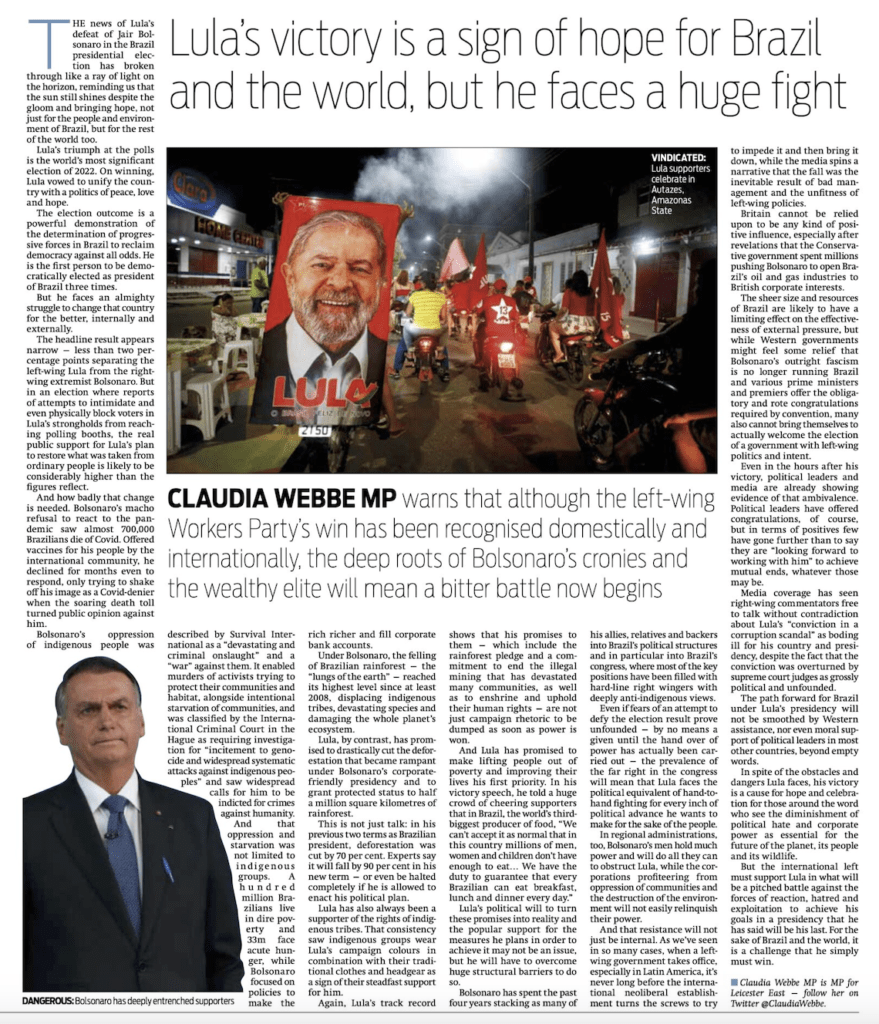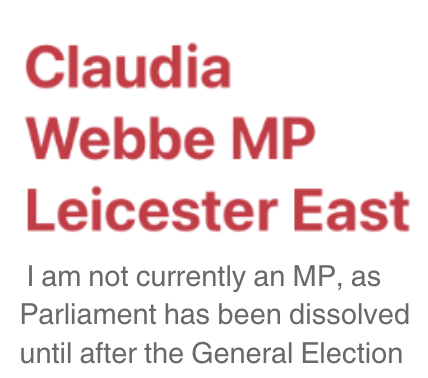
Lula’s Victory is a sign of hope for Brazil and the world, but he faces a huge fight
By Claudia Webbe MP
CLAUDIA WEBBE MP warns that although the left-wing Workers Party’s win has been recognised domestically and internationally, the deep roots of Bolsonaro’s cronies and the wealthy elite will mean a bitter battle now begins
THE news of Lula’s defeat of Jair Bolsonaro in the Brazil presidential election has broken through like a ray of light on the horizon, reminding us that the sun still shines despite the gloom and bringing hope, not just for the people and environment of Brazil, but for the rest of the world too.
Lula’s triumph at the polls is the world’s most significant election of 2022. On winning, Lula vowed to unify the country with a politics of peace, love and hope.
The election outcome is a powerful demonstration of the determination of progressive forces in Brazil to reclaim democracy against all odds. He is the first person to be democratically elected as president of Brazil three times.
But he faces an almighty struggle to change that country for the better, internally and externally.
The headline result appears narrow — less than two percentage points separating the left-wing Lula from the right-wing extremist Bolsonaro. But in an election where reports of attempts to intimidate and even physically block voters in Lula’s strongholds from reaching polling booths, the real public support for Lula’s plan to restore what was taken from ordinary people is likely to be considerably higher than the figures reflect.
And how badly that change is needed. Bolsonaro’s macho refusal to react to the pandemic saw almost 700,000 Brazilians die of Covid. Offered vaccines for his people by the international community, he declined for months even to respond, only trying to shake off his image as a Covid-denier when the soaring death toll turned public opinion against him.
Bolsonaro’s oppression of indigenous people was described by Survival International as a “devastating and criminal onslaught” and a “war” against them. It enabled murders of activists trying to protect their communities and habitat, alongside intentional starvation of communities, and was classified by the International Criminal Court in the Hague as requiring investigation for “incitement to genocide and widespread systematic attacks against indigenous peoples” and saw widespread calls for him to be indicted for crimes against humanity.
And that oppression and starvation was not limited to indigenous groups. A hundred million Brazilians live in dire poverty and 33m face acute hunger, while Bolsonaro focused on policies to make the rich richer and fill corporate bank accounts.
Under Bolsonaro, the felling of Brazilian rainforest — the “lungs of the earth” — reached its highest level since at least 2008, displacing indigenous tribes, devastating species and damaging the whole planet’s ecosystem.
Lula, by contrast, has promised to drastically cut the deforestation that became rampant under Bolsonaro’s corporate-friendly presidency and to grant protected status to half a million square kilometres of rainforest.
This is not just talk: in his previous two terms as Brazilian president, deforestation was cut by 70 per cent. Experts say it will fall by 90 per cent in his new term — or even be halted completely if he is allowed to enact his political plan.
Lula has also always been a supporter of the rights of indigenous tribes. That consistency saw indigenous groups wear Lula’s campaign colours in combination with their traditional clothes and headgear as a sign of their steadfast support for him.
Again, Lula’s track record shows that his promises to them — which include the rainforest pledge and a commitment to end the illegal mining that has devastated many communities, as well as to enshrine and uphold their human rights — are not just campaign rhetoric to be dumped as soon as power is won.
And Lula has promised to make lifting people out of poverty and improving their lives his first priority. In his victory speech, he told a huge crowd of cheering supporters that in Brazil, the world’s third-biggest producer of food, “We can’t accept it as normal that in this country millions of men, women and children don’t have enough to eat… We have the duty to guarantee that every Brazilian can eat breakfast, lunch and dinner every day.”
Lula’s political will to turn these promises into reality and the popular support for the measures he plans in order to achieve it may not be an issue, but he will have to overcome huge structural barriers to do so.
Bolsonaro has spent the past four years stacking as many of his allies, relatives and backers into Brazil’s political structures and in particular into Brazil’s congress, where most of the key positions have been filled with hard-line right wingers with deeply anti-indigenous views.
Even if fears of an attempt to defy the election result prove unfounded — by no means a given until the hand over of power has actually been carried out — the prevalence of the far right in the congress will mean that Lula faces the political equivalent of hand-to-hand fighting for every inch of political advance he wants to make for the sake of the people.
In regional administrations, too, Bolsonaro’s men hold much power and will do all they can to obstruct Lula, while the corporations profiteering from oppression of communities and the destruction of the environment will not easily relinquish their power.
And that resistance will not just be internal. As we’ve seen in so many cases, when a left-wing government takes office, especially in Latin America, it’s never long before the international neoliberal establishment turns the screws to try to impede it and then bring it down, while the media spins a narrative that the fall was the inevitable result of bad management and the unfitness of left-wing policies.
Britain cannot be relied upon to be any kind of positive influence, especially after revelations that the Conservative government spent millions pushing Bolsonaro to open Brazil’s oil and gas industries to British corporate interests.
The sheer size and resources of Brazil are likely to have a limiting effect on the effectiveness of external pressure, but while Western governments might feel some relief that Bolsonaro’s outright fascism is no longer running Brazil and various prime ministers and premiers offer the obligatory and rote congratulations required by convention, many also cannot bring themselves to actually welcome the election of a government with left-wing politics and intent.
Even in the hours after his victory, political leaders and media are already showing evidence of that ambivalence. Political leaders have offered congratulations, of course, but in terms of positives few have gone further than to say they are “looking forward to working with him” to achieve mutual ends, whatever those may be.
Media coverage has seen right-wing commentators free to talk without contradiction about Lula’s “conviction in a corruption scandal” as boding ill for his country and presidency, despite the fact that the conviction was overturned by supreme court judges as grossly political and unfounded.
The path forward for Brazil under Lula’s presidency will not be smoothed by Western assistance, nor even moral support of political leaders in most other countries, beyond empty words.
In spite of the obstacles and dangers Lula faces, his victory is a cause for hope and celebration for those around the word who see the diminishment of political hate and corporate power as essential for the future of the planet, its people and its wildlife.
But the international left must support Lula in what will be a pitched battle against the forces of reaction, hatred and exploitation to achieve his goals in a presidency that he has said will be his last. For the sake of Brazil and the world, it is a challenge that he simply must win.
Claudia Webbe MP is the member of Parliament for Leicester East. You can follow her at www.facebook.com/claudiaforLE and twitter.com/ClaudiaWebbe


